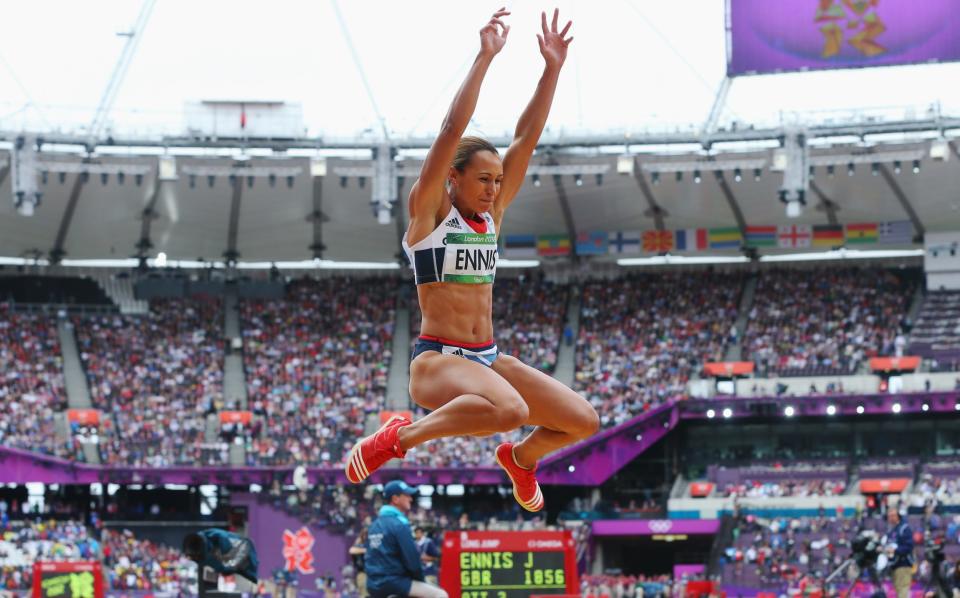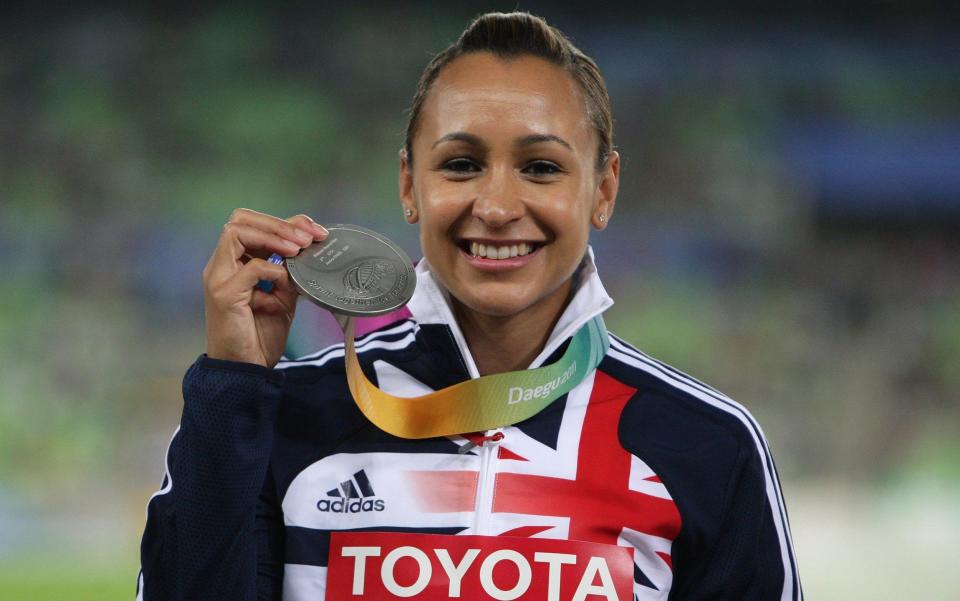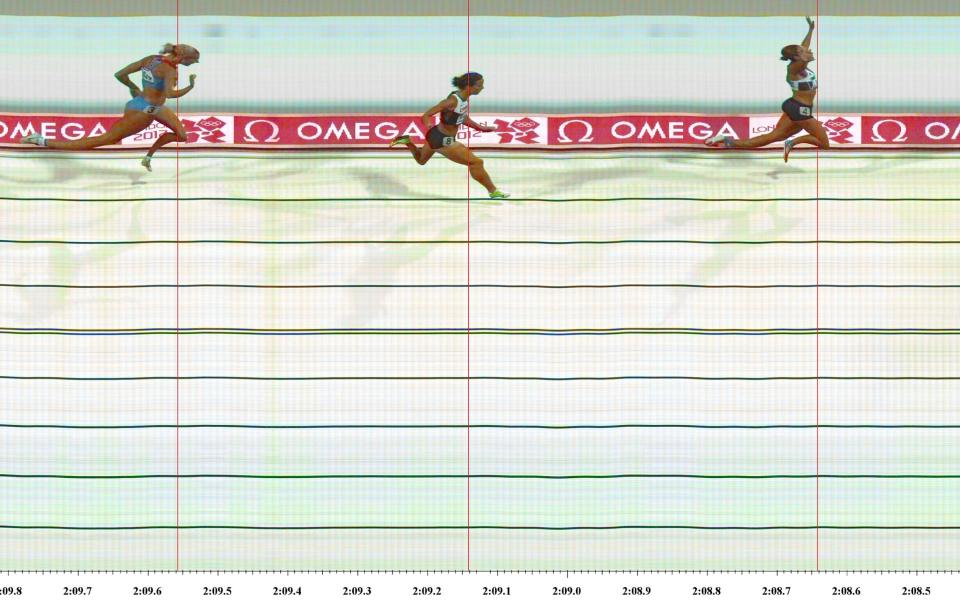Jessica Ennis-Hill exclusive: 'Nine years on, people still come up to me to talk about Super Saturday'

There are only a select few moments in British sport which resonate to the extreme that people can never forget where they were and what they were doing.
England’s Euro 2020 final defeat may well join the 1966 World Cup in football’s offering alongside occasions like Sir Andy Murray’s first Wimbledon triumph and the 2003 rugby union World Cup.
Dame Jessica Ennis-Hill’s ‘Super Saturday’ triumph also remains forever cemented in that most rarefied of company, a fact of ongoing surprise and delight to the poster girl herself of the London 2012 Olympics.
“It’s really strange because, in those days immediately after, I remember speaking to the people around me and saying, ‘It’s a great moment but I’m sure in a year’s time, everyone will have forgotten’,” says Ennis-Hill. “I was very aware that sport is this evolving, moving thing. But nine years down the line, and it still surprises me how clear it is in so many people’s minds.
“It feels bizarre that it was so long ago and yet it feels fresh. It’s lovely having those conversations. It keeps it relevant in my mind which is a really powerful thing.”
Such impromptu discussions arise daily, and usually quite randomly whether in the street, in a supermarket, or while collecting her son Reggie from school. And so what are some of the more notable memories that people share? “It’s such a mix and it often throws me,” says Ennis-Hill, smiling.
“People will be, ‘Hi Jess’ and I will think, ‘I don’t know them’ but they just want to say hi and recount a memory. Mostly it is things with their family and where they watched. I’ve spoken to quite a few who say, ‘We had a child at the time, she’s a girl and we called her Jessica’.
“That is really, really amazing. It’s a moment where people remember what they were doing and how they felt. That Saturday, in particular, was a day when no one could foresee we would have such success. It was incredible.”
It also stands as a reminder of the life-changing opportunities that beckon over the next three weeks when, after an unprecedented one year delay, the Tokyo Olympics are scheduled finally to take place.
Ennis-Hill will be writing exclusively for Telegraph Sport throughout, delivering her unique insights into what it takes to become an Olympic champion and handle the frankly mind-boggling pressure of delivering your greatest performance at the fleeting moment in your life when it most counts.
Easy to forget now, but Ennis-Hill had suffered the heartbreak in 2008 of a stress fracture in her right foot that ruled her out of the Beijing Olympics. She subsequently won consecutive World Championship titles but the wider backdrop when she stood on the start-line for the 100m hurdles, in front of 80,000 eager spectators on the morning of Friday, August 3, was of four long years preparing for this one day.

It is natural to marvel at Ennis-Hill’s athletic feats but, rather like Cathy Freeman in Sydney 12 years earlier, her serenity and focus at this moment of maximum global gaze was arguably more impressive.
She had made a point in the years leading up to London 2012 of refusing all invites to the Olympic Stadium as she had wanted it to all feel fresh and provide a surge of adrenaline. The challenge was suddenly to contain that emotion.
“I was so, so nervous on the warm-up track, practicing over the hurdles and just trying to get rid of that nervous energy because you can’t have the adrenaline pumping too far,” she says.
“Then, when I stepped on to that track, I was blown away. The morning event of the heptathlon is usually relatively empty but, that day, it was full. I just felt ‘wow’. The sun was shining and it was like everything had aligned.
“I felt in the form of my life and I had that crowd which I could thrive on. It was the perfect scenario. Everything was in an absolute sweet spot.”
What followed over the next 12.54 sec was an all-time British sprint hurdles record and then a seemingly serene procession to heptathlon gold. The reality felt rather different. Ennis-Hill was so worried about her alarm clock on the second morning that she set “at least three” and still grimaces at the memory of the seven-hour break between the javelin and the final 800m on the evening of ‘Super Saturday’.
Rather than travel back to the Olympic village and an inevitable throng of well-wishers, Ennis-Hill instead set up a makeshift camp - mattress, chair and treatment table - in the corner of the combined events room beneath the Olympic Stadium.
“You try to shut down and then bring yourself back up maybe an hour or two hour before,” she says, recalling a nervousness that bordered on nausea. “It’s the worst part - I absolutely do not miss those moments.”
Victory in the 800m would still follow to secure the first of three British track and field golds in the space of 44 jaw-dropping minutes. “I had put everything on it, I did win and it was quite a strange emotion,” she says.

“I had that feeling, ‘Gosh, something must have gone wrong. I can’t believe this is everything I worked for’. The days and weeks after were so busy that you don’t have a moment to really reflect.
“The Olympics are just truly global. It’s put out there to everyone. Non sports fans, or people who haven’t seen sports for a long time, get to see the events showcased. The reach is huge and it propels you to another level in a lot of people’s minds. It was a level I had never imagined.
“It probably wasn’t until I had retired that I could sit down and gain that full perspective. It was a massively life-changing moment. It changed my life for lots of different reasons but, at the same time, it didn’t. I always prided myself on having that consistency, keeping values that are important to me.
“I can see how you can be pulled in directions to please people. I didn’t make those major changes to my life. I did come back to Sheffield, and I still surrounded myself with the same great people who I love.”
Ennis-Hill turned down far more offers than she accepted - including TV shows I’m a Celebrity...Get Me Out of Here! and Strictly Come Dancing - before having her son Reggie in 2014 and returning to win a third world title and Olympic silver in Rio. With the perspective of a second child (three-year-old Olivia), and five years now retired, it is the wider journey that she most cherishes.
“Everyone talks about 2012, and it was of course one of the highlights but that time post London, particularly those two years going into Rio, were my hugely defining moments as an athlete and individual,” she says. “It tested me in ways I had never been challenged. A gold medal will always trump everything, but my journey getting to Rio was the one I am probably most proud of.”
That full arc of a career is something that she also now emphasises to young athletes. “At the time, you want to get to the end point of whatever your immediate goal is but, in retirement, you look back at how you got there and, without a doubt, the journey - being able to manage expectation, pressure, set-backs - has been the sweetest part of my success,” she says.
“We tend to want everything instantly. As an athlete, you are impatient but it’s actually a strategic thought-out process. It is not one great leap. It takes lots of steps along the way, forwards and backwards, to get to that point. I think it’s really important for young kids to know that.”
And, as the greatest show in sport looms, how will it feel on the other side of the fence? “There’s no feeling of, ‘I wish I hadn't retired’ but, at the same time, I completely have that feeling where I appreciate that moment when you are at your absolute peak with that whole opportunity in front of you,” she says.
“It’s different but nice to have that emotional connection. It is motivating and inspiring to see the performances we’ve already had this year. When you are an athlete, you are very insular. I can enjoy it this time. I can soak up everything that is going on, delve into everyone’s individual journeys, and not just be on my own wavelength and zone.”

 Yahoo Sport
Yahoo Sport 





































